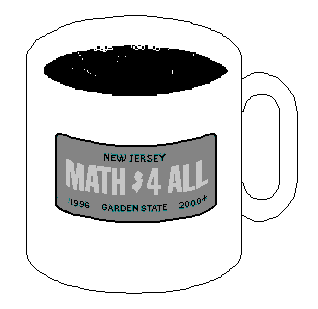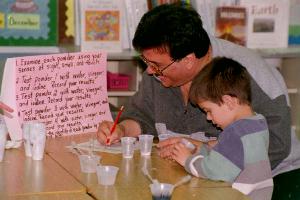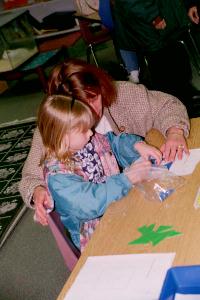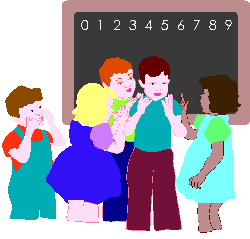
|
| Volume V Number 2 | June 1996 |
Inside This Issue
At Rutgers University,
New Brunswick
Check General Meeting on the Response Form for more information.
Of course, adopting standards does not automatically result in their implementation, but that was clear to everyone. After Commissioner of Education Leo Klagholz described the consequences of the Board's decision as "monumental", he was reminded by a Board member that much needs to take place before that term becomes appropriate; so he promptly amended his remark and described today's decision as the "cornerstone" of the monument. Some of the other necessary components are described in the resolution of the Coalition Board.
Many of us have worked with the mathematics standards over the past three years - drafting the standards, reviewing and submitting comments on the standards, providing input on the curriculum framework, and working to implement the standards locally in classrooms, schools, and districts. All of us can take great pride that the mathematics standards adopted by the Board of Education are close in both vision and content to the standards that we have developed. And all of us must recommit ourselves to working toward their implementation.
A report on Math, Science, and Technology Month appears in this issue.
In addition to the lead article, the New Jersey Mathematics Standards are reflected in the "Standards Announcements", the resolution adopted by the Board of Governors on page 4 , and an article by Coalition Director Joseph G. Rosenstein that was published in several newspapers in April.
The statements of the New Jersey Mathematics Standards adopted by the Board appear in this Newsletter; you can access the complete document, including the grade-level progress indicators, from the New Jersey Mathematics Coalition's World Wide Web page at http://dimacs.rutgers.edu/archive/nj_math_coalition/.

|
Become an Affiliate of the New Jersey Mathematics Coalition today (for a mere $25.00) and you will receive one of these attractive white mugs with the distinctive blue Coalition license plate that is fast becoming such a status symbol from Cape May to Millville. You will also receive the satisfaction that comes from knowing that you are helping to support much needed change in mathematics education around the state.
Just check off the AFFILIATION box on the Response Form.
To comment on any topic related to the Newsletter, send e-mail, write or call:
FRAMEWORK
|
STANDARDS IN-DISTRICT WORKSHOPS
|
STANDARDS DISSEMINATION PROJECT
|
STANDARDS CELEBRATION
|
PRESENTATIONS ON THE MATHEMATICS STANDARDSThe presentation is titled "Mathematics to Prepare Our Children for the 21st Century" and discusses the New Jersey Mathematics Standards. The presentation, which lasts for 30 minutes, will discuss the vision and recommendations of the standards, and current efforts to develop and implement state mathematics standards. If your Board of Education, PTA or other civic group is interested, please check off the PRESENTATION box on the Response Form.
|
REGIONAL WORKSHOPS ON THE STANDARDS FOR K - 4 TEACHERS
|
The New Jersey Mathematics Coalition is committed to the principle that all students, not just some, can and should achieve at high levels. Without that commitment we will send a message to some students that not much is expected of them. As a consequence, we will prepare them for jobs which will no longer exist, and we will cripple their future and the future of our state and our society. There may be exceptions to this principle, but we must ensure that those exceptions are exceptional.
Accordingly, the Board of Governors of the New Jersey Mathematics Coalition adopts the following resolution for transmittal to the New Jersey State Board of Education:
Also critical is ensuring that teachers have available and take advantage of opportunities for professional development that will enable them to achieve the standards in their classrooms. The Department of Education needs both to harness the human resources in the state into a coordinated plan for statewide professional development and to encourage schools and districts to commit themselves to the ongoing professional development of their instructional staffs.
Change of the magnitude described cannot happen overnight and requires the active support and energy of teachers, parents, and the community. Implementing some of the standards will be more difficult than others, so that the adoption of these standards should be seen as a longterm plan which will be phased in incrementally over a number of years.
Standards describe the goals of our educational system, what we would like all children to know and be able to do. If we want high achievement, we need to set high goals. If we want to determine whether we are successful, we need goals against which we can measure our accomplishments. If we want to develop a road-map for success, we need to know where we are trying to go. We need to adopt standards.
The standards that we set must be high standards, and must apply to all students. Many of today's jobs will not exist in a decade, and many of the new jobs will require substantial skills in reasoning, in problem-solving, and in communicating both proposed solutions and the reasoning behind them. If we don't set high standards for all students, many of our youngsters will find no place in our increasingly complex economy. We need to set high standards for all students.
Without statewide standards, each district has to define its own goals. In theory that may be a good idea, but in New Jersey, a state with over 600 districts, individual districts do not have the resources to define in detail world-class educational goals. On the other hand, statewide standards do not imply statewide curriculum. Returning to the road-map analogy, we can have a common destination but reach it using many different paths with each district using a different curriculum. We need to adopt statewide standards in all content areas.
What are some of the changes that the mathematics standards call for? One is that students need to be able to apply mathematics to solve problems, not just memorize facts and rules. Should kids know the multiplication table? Absolutely! But if that's all they know, they won't get very far. My eight year old daughter needs to realize that when I cut her waffle very neatly using two vertical cuts and three horizontal cuts, she can use those multiplication facts to figure out how many pieces there are altogether.
A second change is that students at all grade levels need to be exposed to a broader variety of mathematical topics. Geometry should be more prominent at all grade levels, so that, for example, third graders should use grid paper to find the areas of their hands. Statistical concepts should be introduced in elementary school, so that, for example, children can make charts which display their classmates' preferences among soft drinks. And middle school children should, for example, be able to determine the best route for their car pool using concepts of discrete mathematics.
A third important change involves the increased use of mathematical tools, ranging from pattern blocks and geoboards to calculators and computers. These tools can be used both to enhance students' understanding of mathematical concepts and to enable them to do technically difficult problems without getting bogged down in tedious computations. Should kids be able to multiply two digit numbers with pencil and paper? Certainly, but adults no longer do it that way (be honest, when did you last do it?), so it's not likely that kids will either. They need to learn how to use available technology wisely.
The New Jersey Mathematics Coalition has been working on the mathematics standards for nearly four years, basing its efforts on the 1989 standards published by the National Council of Teachers of Mathematics. It has used a federal grant to develop a guide for teachers and curriculum leaders on how the standards can be implemented locally; this document, called the Preliminary Version of the New Jersey Mathematics Curriculum Framework, is available on the Internet at http://dimacs.rutgers.edu/archive/nj_math_coalition/. Throughout this four-year project, the mathematics standards have been discussed and scrutinized by educators, parents, and business leaders throughout the state, and have been strengthened by their comments.
The mathematics standards now being considered by the state Board of Education represent the collective vision of the mathematics education community of New Jersey. They embody the goal: "To enable ALL of New Jersey's children to step forward into the next century with the mathematical skills, understandings, and attitudes that they will need to be successful in their careers and daily lives." The mathematics standards presented to the Board of Education deserve the support of all parents, teachers, and citizens of New Jersey. We need to adopt the proposed standards in mathematics.

This year, events for Math, Science, and Technology Month (MSTM) ran the gamut in size, location and content. From Family Science and Technology nights in Cape May County and robotics and computer activities in Salem County to science fairs and graphing calculator demonstrations in Sussex County, children and parents from across New Jersey were engaged in exploring new educational technology and activities together. Some events were targeted to a single 3rd grade class while others involved several grade levels in a school, and many incorporated not only the entire school but the entire school district in several days of varied activities.
Many events reached out not only to parents and children but to the surrounding community at large. Several tied in aspects of technology with senior citizens - using the children to introduce the Internet to grandparents for example.
Some of the more unique and inventive events :


The MSTM '96 Calendar Contest Winners are:
| Name | Grade Level | Month | Town | School |
| Ryan Roberts | 1st | January | Tinton Falls | Holy Innocents School |
| Louis Carotenuto | 2nd | February | Keyport | St. Joseph's |
| Amanda Murawski | 3rd | March | Sewaren | St. James School |
| Kaitlin Black | 4th | April | North Cape May | Maud Adams School |
| Anne Marie Ryfinski | 5th | May | Lawrenceville | Incarnation School |
| Kevin Brandon | 6th | June | Montclair | St. Catherine of Siena |
| Roseann Wu | 7th | July | Holmdel | William R. Satz School |
| Maria Agustin | 8th | August | Dumont | St. Mary's School |
| Anabelle de la Paz | 9th | September | Edison | Mother Seton Regional HS |
| Meghan Nering | 10th | October | Flemington | North Hunterdon HS |
| Megan Seubert | 11th | November | Hamilton Square | Steinert HS |
| Joanne Domingo | 12th | December | Metuchen | Mother Seton Regional HS |
Special thanks go to the State Chamber of Commerce (and the local Chambers) for judging the MSTM Calendar Contest and to Dr. Robert Weber (and his students) at Trenton State College for designing the Contest.
New Jersey's Statewide Systemic Initiative, Trenton Diocese, Research for Better Schools, New Jersey Science Teachers Association, New Jersey Science Supervisors Association, Association of Mathematics Teachers of New Jersey, Technology Educators Association of New Jersey, Liberty Science Center, Thomas H. Kean State Aquarium, New Jersey Association of Independent Schools, Urban League of Hudson and Essex Counties, New Jersey PTA, New Jersey Department of Education.
The following organizations either provided funding, materials or in-kind services to the Coalition for MSTM. New Jerseys Statewide Systemic Initiative, Mid-Atlantic Eisenhower Consortium for Math/Science Education at Research for Better Schools, Scott Foresman and Company, Fleet Bank, Jersey Central Power and Light, New Jersey Chamber of Commerce, American Chemical Society, U.S. Department of Education, National Science Foundation.
Problem posing and problem solving involve examining situations that arise in mathematics and other disciplines and in common experiences, describing these situations mathematically, formulating appropriate mathematical questions, and using a variety of strategies to find solutions. By developing their problem-solving skills, students will come to realize the potential usefulness of mathematics in their lives.
Standard 2. All students will communicate mathematically through written, oral, symbolic, and visual forms of expression.
Communication of mathematical ideas will help students clarify and solidify their understanding of mathematics. By sharing their mathematical understandings in written and oral form with their classmates, teachers, and parents, students develop confidence in themselves as mathematics learners and enable teachers to better monitor their progress.
Standard 3. All students will connect mathematics to other learning by understanding the interrelationships of mathematical ideas and the roles that mathematics and mathematical modeling play in other disciplines and in life.
Making connections enables students to see relationships between different topics, and to draw on those relationships in future study. This applies within mathematics, so that students can translate readily between fractions and decimals, or between algebra and geometry; to other content areas, so that students understand how mathematics is used in the sciences, the social sciences, and the arts; and to the everyday world, so that students can connect school mathematics to everyday life.
Standard 4. All students will develop reasoning ability and will become selfreliant, independent mathematical thinkers.
Mathematical reasoning is the critical skill that enables a student to make use of all other mathematical skills. With the development of mathematical reasoning, students recognize that mathematics makes sense and can be understood. They learn how to evaluate situations, select problem-solving strategies, draw logical conclusions, develop and describe solutions, and recognize how those solutions can be applied. Mathematical reasoners are able to reflect on solutions to problems and determine whether or not they make sense. They appreciate the pervasive use and power of reasoning as a part of mathematics.
Standard 5. All students will regularly and routinely use calculators, computers, manipulatives, and other mathematical tools to enhance mathematical thinking, understanding, and power.
Calculators, computers, manipulatives, and other mathematical tools need to be used by students in both instructional and assessment activities. These tools should be used, not to replace mental math and paper-and-pencil computational skills, but to enhance understanding of mathematics and the power to use mathematics. Historically, people have developed and used manipulatives (such as fingers, base ten blocks, geoboards, and algebra tiles) and mathematical devices (such as protractors, coordinate systems, and calculators) to help them understand and develop mathematics. Students should explore both new and familiar concepts with calculators and computers, but should also become proficient in using technology as it is used by adults, that is, for assistance in solving real-world problems.
Standard 6. All students will develop number sense and an ability to represent numbers in a variety of forms and use numbers in diverse situations.
Number sense is defined as an intuitive feel for numbers and a common sense approach to using them. It is a comfort with what numbers represent, coming from investigating their characteristics and using them in diverse situations. It involves an understanding of how different types of numbers, such as fractions and decimals, are related to each other, and how they can best be used to describe a particular situation. Number sense is an attribute of all successful users of mathematics.
Standard 7. All students will develop spatial sense and an ability to use geometric properties and relationships to solve problems in mathematics and in everyday life.
Spatial sense is an intuitive feel for shape and space. It involves the concepts of traditional geometry, including an ability to recognize, visualize, represent, and transform geometric shapes. It also involves other, less formal ways of looking at two- and three-dimensional space, such as paper-folding, transformations, tessellations, and projections. Geometry is all around us in art, nature, and the things we make. Students of geometry can apply their spatial sense and knowledge of the properties of shapes and space to the real world.
Standard 8. All students will understand, select, and apply various methods of performing numerical operations.
Numerical operations are an essential part of the mathematics curriculum. Students must be able to select and apply various computational methods, including mental math, estimation, paper-and-pencil techniques, and the use of calculators. Students must understand how to add, subtract, multiply, and divide whole numbers, fractions, and other kinds of numbers. With calculators that perform these operations quickly and accurately, however, the instructional emphasis now should be on understanding the meanings and uses of the operations, and on estimation and mental skills, rather than solely on developing pencil-and-paper skills.
Standard 9. All students will develop an understanding of systems of measurement and will use measurement to describe and analyze phenomena.
Measurement helps describe our world using numbers. We use numbers to describe simple things like length, weight, and temperature, but also complex things such as pressure, speed, and brightness. An understanding of how we attach numbers to those phenomena, familiarity with common measurement units like inches, liters, and miles per hour, and a practical knowledge of measurement tools and techniques are critical for students' understanding of the world around them.
Standard 10. All students will use a variety of estimation strategies and recgonize situations in which estimation is appropriate.
Estimation is a process that is used constantly by mathematically capable adults, and that can be mastered easily by children. It involves an educated guess about a quantity or a measure, or an intelligent prediction of the outcome of a computation. The growing use of calculators makes it more important than ever that students know when a computed answer is reasonable; the best way to make that decision is through estimation. Equally important is an awareness of the many situations in which an approximate answer is as good as, or even preferable to, an exact answer.
Standard 11. All students will develop an understanding of patterns, relationships, and functions and will use them to represent and explain realworld phenomena.
Patterns, relationships, and functions constitute a unifying theme of mathematics. From the earliest age, students should be encouraged to investigate the patterns that they find in numbers, shapes, and expressions, and, by doing so, to make mathematical discoveries. They should have opportunities to analyze, extend, and create a variety of patterns and to use pattern-based thinking to understand and represent mathematical and other real-world phenomena. These explorations present unlimited opportunities for problem-solving, making and verifying generalizations, and building mathematical understanding and confidence.
Standard 12. All students will develop an understanding of statistics and probability and will use them to describe sets of data, model situations, and support appropriate inferences and arguments.
Probability and statistics are the mathematics used to understand chance and to collect, organize, describe, and analyze numerical data. From weather reports to sophisticated studies of genetics, from election results to product preference surveys, probability and statistical language and concepts are increasingly present in the media and in everyday conversations. Students need this mathematics to help them judge the correctness of an argument supported by seemingly persuasive data.
Standard 13. All students will develop an understanding of algebraic concepts and processes and will use them to represent and analyze relationships among variable quantities and to solve problems.
Algebra is a language used to express mathematical relationships. Students need to understand how quantities are related to one another, and how algebra can be used to concisely express and analyze those relationships. Modern technology provides tools for supplementing the traditional focus on algebraic techniques, such as solving equations, with a more visual perspective, with graphs of equations displayed on a screen. Students can then focus on understanding the relationship between the equation and the graph, and on what the graph represents in a real-life situation.
Standard 14. All students will apply the concepts and methods of discrete mathematics to model and explore a variety of practical situations.
Discrete mathematics is the branch of mathematics that deals with arrangements of distinct objects. It includes a wide variety of topics and techniques that arise in everyday life, such as how to find the best route from one city to another, where the objects are cities arranged on a map. It also includes how to count the number of different combinations of toppings for pizzas, how best to schedule a list of tasks to be done, and how computers store and retrieve arrangements of information on a screen. Discrete mathematics is the mathematics used by decision-makers in our society, from workers in government to those in health care, transportation, and telecommunications. Its various applications help students see the relevance of mathematics in the real world.
Standard 15. All students will develop an understanding of the conceptual building blocks of calculus and will use them to model and analyze natural phenomena.
The conceptual building blocks of calculus are important for everyone to understand. How quantities such as world population change, how fast they change, and what will happen if they keep changing at the same rate are questions that can be discussed by elementary school students. Another important topic for all mathematics students is the concept of infinity -- what happens as numbers get larger and larger and what happens as patterns are continued indefinitely. Early explorations in these areas can broaden students' interest in and understanding of an important area of applied mathematics.
Standard 16. All students will demonstrate high levels of mathematical thought through experiences which extend beyond traditional computation, algebra, and geometry.
High expectations for all students form a critical part of the learning environment. The belief of teachers, administrators, and parents that a student can and will succeed in mathematics often makes it possible for that student to succeed. Beyond that, this standard calls for a commitment that all students will be continuously challenged and enabled to go as far mathematically as they can.
June 24 - July 19.
Leadership Program in Discrete Mathematics for K-8 teachers.
Two-week residential (7/8-7/19) and commuter (6/24-7/9) institutes at
Rutgers University, New Brunswick, NJ.
Graduate credit is available and funding from the National Science
Foundation will provide food and lodging (for residential
participants) and a $600 stipend. This program is sponsored by the
Center for Discrete Mathematics and Theoretical Computer Science
(DIMACS) and the Rutgers Center for Mathematics, Science, and Computer
Education. For more information call Stephanie Micale, e-mail to
micale@dimacs.rutgers.edu or (908)445-4065.
June 24-28
AP Statistics Institute at Montclair State Unversity.
For teachers planning to teach the new AP Statistics course. Graduate
credit, which includes work beyond the institute week, will be
available. Estimated cost ($600) includes breakfast, coffee breaks
and lunch as well as printed materials, text books and a loaner
calculator. For additional information contact Tony Piccolino, e-mail
piccolinoa@alpha.montclair.edu or 201-655-7247.
June 24-28.
AMTNJ - Three Institutes. Elementary Mathematics, Improving the HSPT and
EWT, and Hands-On Approaches to Algebra.
The Institutes will be held in Millville, New Jersey Institute of
Technolog,y and Trenton State College. Cost for the week is $285.
For more information contact Nancy Schultz at (201) 790-6184.
June 26.
Calculator and Computer Precalculus (C2PC) five day summer institute at
Middlesex County College (MCC).
The institute focuses on advanced algebra, trigonometry, precalculus,
math analysis and/or calculus. For more information contact MCC's
Office of School Relations (908) 906-2554.
July,
TRANSIT-NJ Geometry Institute (7/8-7/12), Middle School
Mathematics Institute (7/15-7/19), Elementary School Mathematics
Institute (7/10-7/11).
For additional information contact Ken Wolff, Montclair State
University, e-mail wolffk@alpha.montclair.edu or
(201)655-5353.
July 15 -19,
TRANSIT-NJ AC2E (Algebra with Calculator Enhancement)
Institute.
Designed to help teachers become proficient in the use of the TI-82 in
the teaching of pre-algebra and algebra. For additional information
contact Ken Wolff, Montclair State University, e-mail
wolffk@alpha.montclair.edu or (201)655-5353.
July 15 - August 9,
Young Scholars Program In Discrete Mathematics at Rutgers University,
New Brunswick, New Jersey.
High School Teachers: if you know of a sophomore or junior who could
become interested in a career in mathematics you should contact
Stephanie Micale at (908)445-4065. There are only 45 slots open for
students throughout New Jersey. The students will participate in an
intensive one-month academic program where they will meet
mathematicians and computer scientists, learn about discrete
mathematics, work on a research project, be engaged in computer
activities, participate in workshops on careers in the mathematical
sciences, and go on field trips.
August 12 - 16.
Institutes for New Mathematics Teachers, New Science Teachers, and New
Elementary Teachers, Rutgers University, New Brunswick.
Three parallel programs for those who will be teaching mathematics,
science, or elementary school for the first time in the fall of 1996
or those who have at most two years of prior teaching experience.
This is a residential program at Rutgers University, New Brunswick,
New Jersey. Cost will be $750 per participant for New Jersey
teachers, $1,500 for those who teach in other states. Reduced fees
are available to a limited number of New Jersey teachers, particularly
from urban or special needs districts. Graduate credit is available.
For more information call Michelle Bartley-Taylor at 908-445-4065 or
e-mail
mbt@dimacs.rutgers.edu.
August 19 - 28.
Standards Regional Workshops.
Workshops on the New Jersey Mathematics Standards for K-4 teachers
presented by workshop leaders from the Standards Dissemination
Project. To sign up, please check off the appropriate WORKSHOP boxes
on the Response Form.
August 22-23.
A Crash Course in Discrete Mathematics for high school teachers.
See announcement.
October 23-25.
AMTNJ's Annual Conference.
Hilton, East Brunswick. For more information contact Nancy Schultz at
(201) 790-6184.
November 9.
MAA New Jersey 40th Anniversary Conference.
Held at Lucent Technologies in Murray Hill. Contact Terry Michnowicz
at (201)200-3219 for more information.

|
See the calendar of events for additional information on these exciting programs!
Call
908/445-4065
for more details!
To receive an application, email micale@dimacs.rutgers.edu, call 908/445-4065 or write to:
Leadership Program in Discrete Mathematics
P. O. Box 10867
New Brunswick, New Jersey 08906